During the period of decolonization the colonized are called upon to be reasonable. They are offered rock-solid values, they are told in great detail that decolonization should not mean regression, and that they must rely on values which have proved to be reliable and worthwhile. It so happens that when the colonized hear a speech on Western culture they draw their machetes or at least check to see they are close to hand.
– Frantz Fanon, The Wretched of the Earth
At the beginning of the 20th century, under the reign of King Leopold II of Belgium, the rubber plantations of the Congo were perpetually littered with the severed hands of insufficiently productive colonized workers. While the peoples of Africa and Asia were dehumanized, tortured, and murdered, far away in distant Europe, the socialists of the Second International came together to debate their colonial policies.
Belgian “socialists” like Hendrick van Kol and Modeste Terwagne lauded the civilizing mission of colonialism and the immense benefits brought by colonial economic development.1British socialists went back and forth on the proper “socialist” methods of colonial rule, completely oblivious to the Swadeshi movement in colonial India, where the workers and peasants of Bengal engaged in mass civil disobedience, boycotts, strikes at jute mills, and even armed resistance. For the so-called socialists in the center of the empire, the agents of liberation could only emerge in London and Paris, not Calcutta.
Recently, Dan La Botz and Stephen R. Shalom took it upon themselves to upbraid those socialists in the United States of America whom they deem insufficiently critical of Hamas’s actions on October 7, demanding condemnations as a moral imperative for all socialists. La Botz and Shalom make some faulty assumptions in their piece: that Israel is winning this war (it is not), that Americans and others retain significant faith in public institutions like legacy media, international law, or the institutions of liberal democracies (especially for younger people, they do not), and that the audience for revolutionary politics can be found among settlers of the Zionist entity (they cannot).
But perhaps the most egregious assumption that La Botz and Shalom make in their short article is that socialists in the United States are the proper referees of anticolonial movements the world over.
The ongoing Nakba
On April 9, 1948, Zionist forces burst into the Palestinian village of Deir Yassin, spraying the houses with machine-gun fire and murdering many of the villagers. Those who survived were rounded up and murdered, their bodies abused and the women raped before being killed. Fahim Zaydan, a twelve-year-old, witnessed his own family being murdered in front of his eyes:
They took us out one after the other; shot an old man and when one of his daughters cried, she was shot too. Then they called my brother Muhammad, and shot him in front of us, and when my mother yelled, bending over him—carrying my little sister Hudra in her hands, still breastfeeding her—they shot her too.
Ilan Pappe has written of the Zionist forces’ complete disregard of any combatant/civilian distinction, extending even to the slaughter of thirty babies in Deir Yassin.2The stories of gang rapes during the Nakba, including of children, are too brutal to recount here.
These atrocities served a political end for the emerging Zionist entity. As the scholar of settler colonialism Patrick Wolfe has argued, settler society requires the “elimination of the native” in order to establish the settler society on their land. This is not just a one-off occurrence: “Settler colonizers come to stay: invasion is a structure not an event.”3
The history of the Israeli occupation is filled with atrocity after atrocity. For years, Israel has limited the calories and electricity allowed to enter the Gaza strip, allowing just enough food and water in to maintain the Palestinian population at subsistence level. La Botz and Shalom invoke Israeli children five times in their short piece, but for Palestinians in Gaza the very concept of childhood has been robbed from them. Thousands of Palestinians have languished for years in Israeli jails, and almost every single freed Palestinian prisoner in the last month reports abuse, sexual assault, and torture. A 16-year-old child in Gaza today has lived through six different wars already, subject to deep poverty and intense, prolonged, and repeated trauma their entire lives.
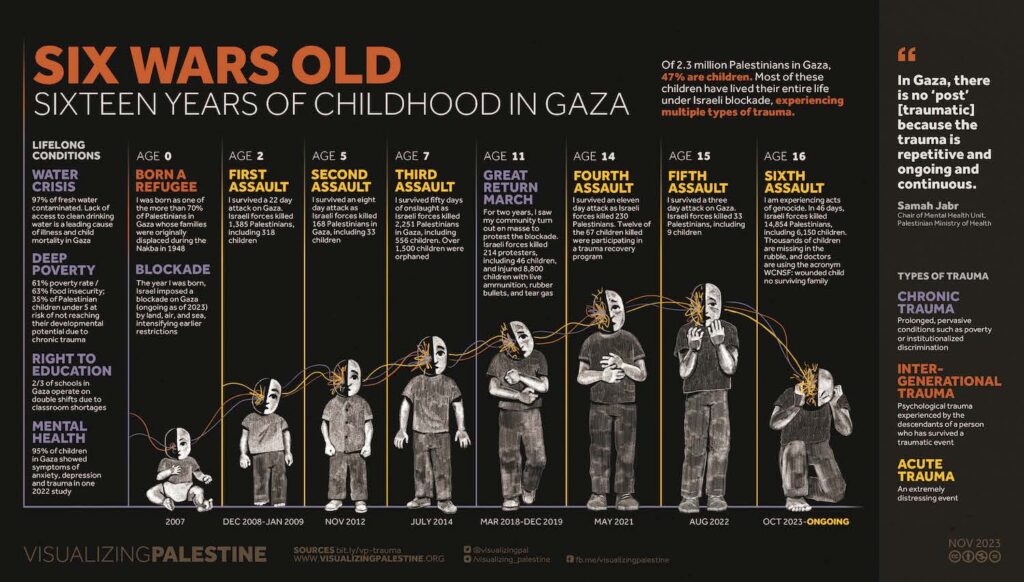
Since October, the settler colonial entity known as Israel has been conducting a systematic genocide of Palestinians. With cold intention, Israel targets journalists, doctors, and vocal critics. Israel sought out the brilliant poet and teacher Refaat Alareer, silencing the “voice of Gaza” and many from his family forever with a missile. Right now, the world watches Al Jazeera and Instagram as beloved Palestinian journalists document unspeakable horrors, rescue children from collapsed buildings, and find small joys in shared meals with the survivors. The world watches while Israeli airstrikes obliterate hospitals, shelters, and anyone willing to speak out defiantly against the colonial occupier.
All of this is made possible by the unconditional political backing of the United States. The United States supplies weapons, including hellfire missiles and white phosphorous, for seemingly endless Israeli war crimes. The U.S. is chiefly responsible for preventing other states from intervening to stop the bloodshed. This is the context in which La Botz and Shalom are dissecting the Palestinian resistance.
Writing from the United States, La Botz and Shalom argue that we should “retire” Malcolm X’s famous slogan “by any means necessary” from our liberatory lexicon, and “ban the term ‘unconditional support.’” “How can we not have conditions relating to our support?” they ask. Only “legitimate means” are permissible in the struggle for liberation, according to La Botz and Shalom. The arbiters of such legitimacy, presumably, are also to be found in the United States of America.
Such sentiments, expressed from the U.S. imperial core while the U.S. government is supplying the bombs dropping on Palestinians, are at best irrelevant and at worst quite harmful to the cause of Palestinian liberation. They are also out of step with a longstanding historical approach to the alleged “excesses” of liberation movements among the oppressed.
The violence of the oppressed
It may be surprising given the intensity of today’s moral outrage among some sections of the Western Left, but violence by resistance movements of the colonized and oppressed is not a historically new phenomenon.
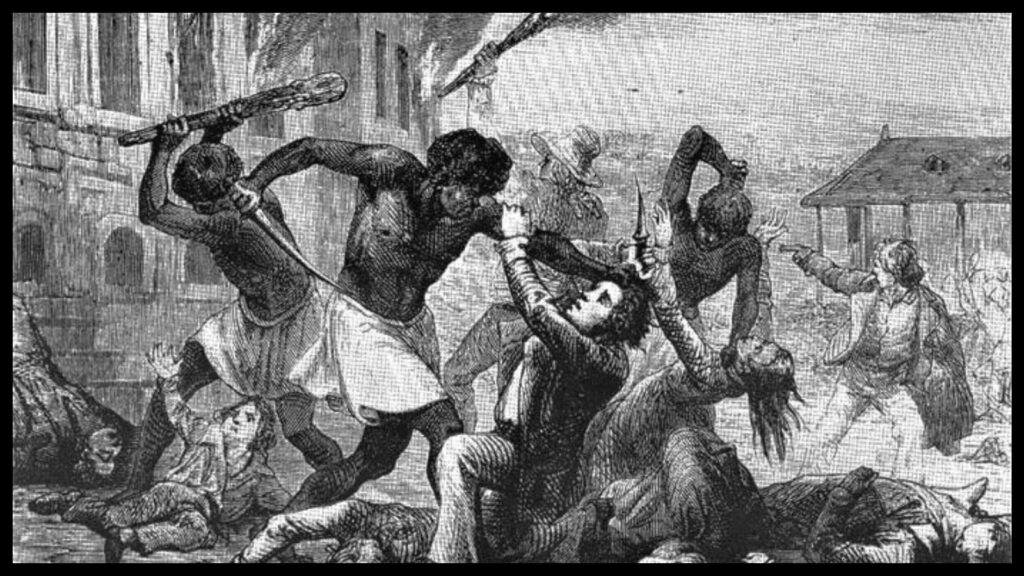
Slavery began in Haiti soon after the arrival of Christopher Columbus in 1492. For more than two centuries, the white slaver class subjected an enslaved Black population to unspeakable atrocities, torture, and comprehensive dehumanization. In the early months of 1791, “neglected and ignored by all the politicians of every brand and persuasion,” the enslaved people of Haiti organized themselves to take their freedom into their own hands. C.L.R. James repeatedly emphasizes the “thoroughly prepared and organized” character of their revolt.4
Righteous as it was, the insurrection was replete with brutality:
The slaves destroyed tirelessly. Like the peasants in the Jacquerie or the Luddite wreckers, they were seeking their salvation in the most obvious way, the destruction of what they knew was the cause of their sufferings; and if they destroyed much it was because they had suffered much. They knew that as long as these plantations stood their lot would be to labor on them until they dropped. The only thing was to destroy them. From their masters they had known rape, torture, degradation, and at the slightest provocation, death. They returned in kind. For two centuries the higher civilization had shown them that power was used for wreaking your will on those whom you controlled. Now that they held power they did as they had been taught. In the frenzy of the first encounters they killed all, yet they spared the priests whom they feared and the surgeons who had been kind to them. They, whose women had undergone countless violations, violated all the women who fell into their hands, often on the bodies of their still bleeding husbands, fathers and brothers. “Vengeance! Vengeance!” was their war-cry, and one of them carried a white child on a pike as a standard.
And yet they were surprisingly moderate, then and afterwards, far more humane than their masters had been or would ever be to them. They did not maintain this revengeful spirit for long. The cruelties of property and privilege are always more ferocious than the revenges of poverty and oppression. For the one aims at perpetuating resented injustice, the other is merely a momentary passion soon appeased. As the revolution gained territory they spared many of the men, women, and children whom they surprised on plantations.5
There is nothing to celebrate or condone in such horrors. But do socialists have a moral responsibility, when discussing the world-historic revolution of the enslaved people of Haiti and the social earthquake it caused around the world, to forefront a condemnation of the “immorality and strategic idiocy” of their means, as La Botz and Shalom advocate now?
The horrors of U.S. American slavery—its centuries of the most intimate cruelties, family separation, bodily disfigurement, rape, daily degradation, torture of the most extreme and unimaginable kind—have been well documented. In 1831, Nat Turner led a slave insurrection in the United States against this brutal system. Over the course of 48 hours, Turner’s insurrection butchered some 60 white people, including men, women, and children. For a moment, the grim devastation wrought by the revolting slaves came close to the sadistic cruelty perpetrated by the slaveowners on a daily basis. White southerners and northerners almost across the board denounced Turner’s “fanatical delusion,” demonizing his savagery as a means of obscuring the barbarous system he was responding to.
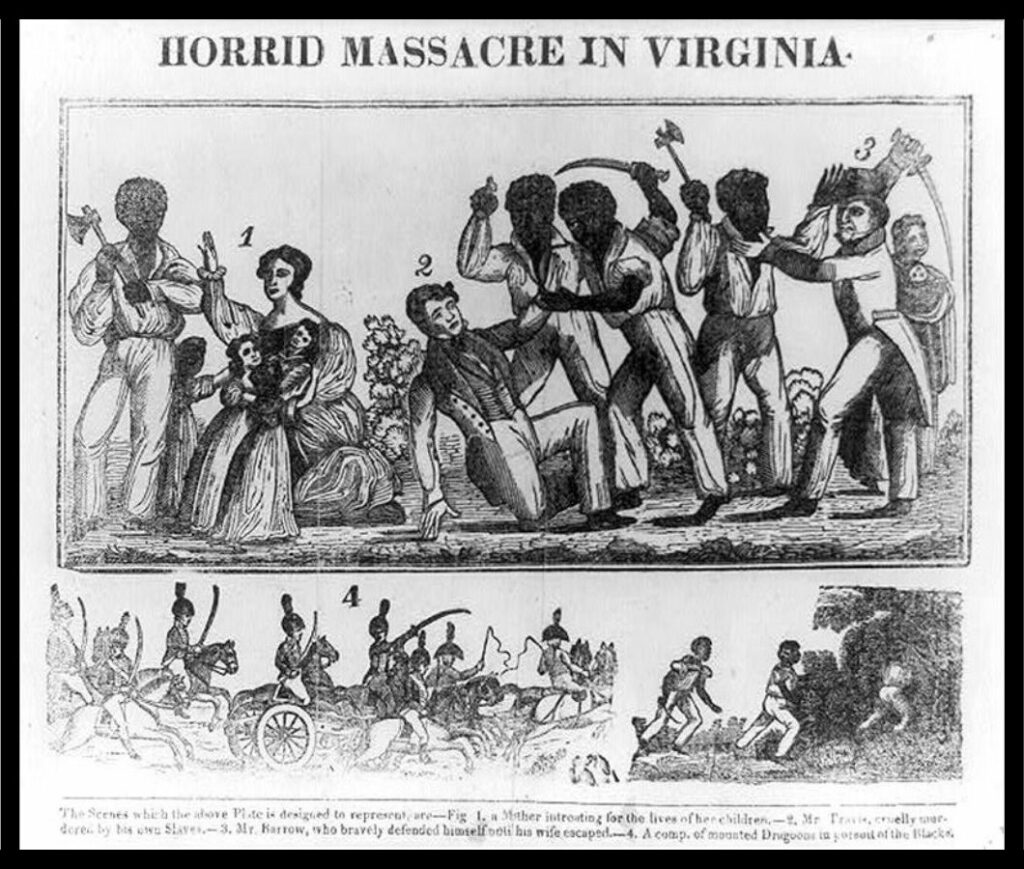
There were exceptions, however. White abolitionists like William Lloyd Garrison (who was, notably, an avowed pacifist) and the movement he represented, while horrified at Turner’s “excesses,” did not condemn the revolt. “I do not justify the slaves in their rebellion; yet I do not condemn them,” Garrison wrote. He denounced the “patriotic hypocrites” directly: “Cast no reproach upon the conduct of the slaves, but let your lips and cheeks wear the blisters of condemnation!” For his refusal to condemn an insurrection against slavery, a $5,000 price was put on Garrison’s head.
Should socialists living freely in a country built on slavery and genocide tell the story of Nat Turner’s rebellion as a lesson in illegitimate methods? Is it a socialist responsibility to deplore the violence of the oppressed in great detail, so the leftists of the Global North today don’t get the wrong idea?
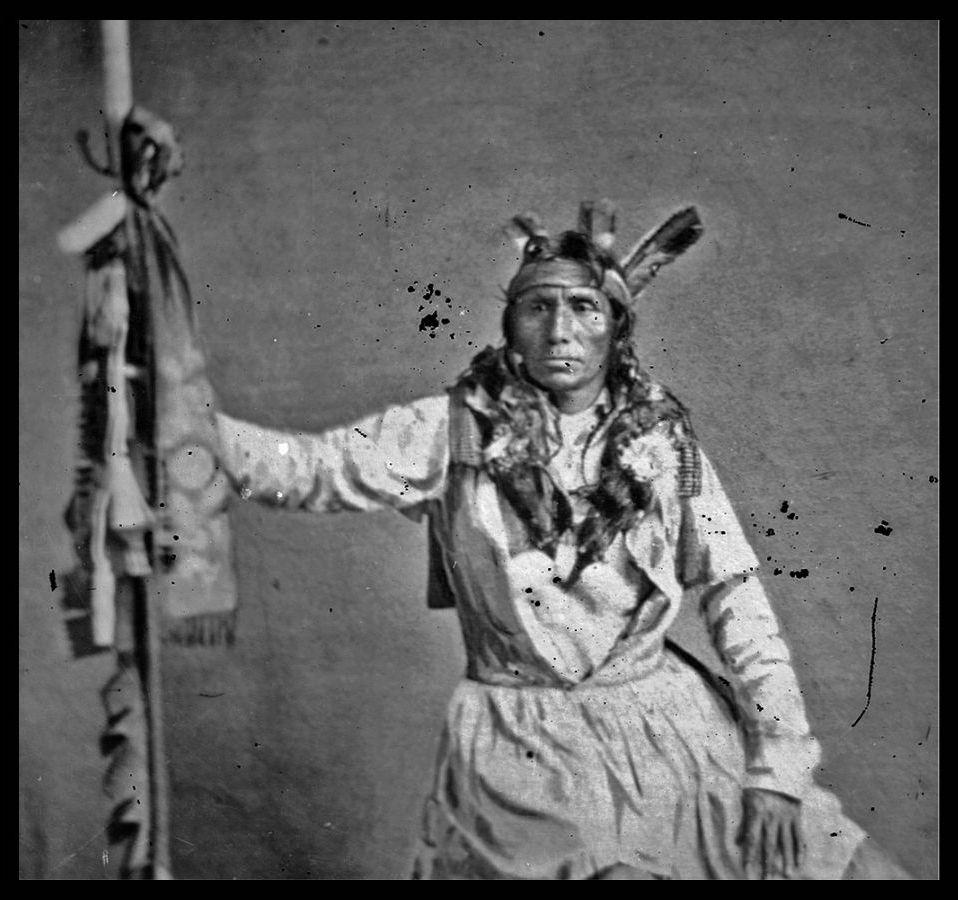
The genocidal westward expansion of the United States across Turtle Island was filled with grisly atrocities against the Indigenous peoples of this land. In brutal ethnic cleansings like the Trail of Tears and the Trail of Death, hundreds of thousands of people were forcibly expelled from their homelands, facing disease, starvation, and unceremonious death. By 1862, the Dakota people had been reduced to starvation and stripped of most of their lands, arms, and horses. In August of that year, Dakota warriors under the leadership of Little Crow began to fight back, expelling whites from the Dakota homelands, and killing more than 800 of them, including settlers, traders, and soldiers.6
In the view of La Botz and Shalom, should socialists condemn the Dakota and other brave Indigenous warriors and insist on the use of the “legitimate means” of peaceful protest and moral appeal during the ethnic cleansing of Turtle Island?
In Nazi-occupied Poland during the Second World War, almost a half million Jews were imprisoned in the Warsaw Ghetto, an area covering just over a square mile. For years, hundreds of thousands of Jewish people subsisted close to starvation while awaiting deportation to the Nazi extermination camps. Drawing on the heroic tradition of Jewish resistance, inhabitants of the ghetto refused to accept such barbaric degradation and slaughter. Starting in April 1943, they organized the Warsaw Ghetto Uprising primarily under the leadership of the Jewish Combat Organization (ŻOB). Nazis retaliated with a plan to “liquidate the Ghetto.” One report of a German woman details some of the methods of the resistance. These included attacks not only on Nazi soldiers, but also on civilian officials; and mailed bombs, assassinations, and more. She describes the situation in a letter to the SS Command:
Under Ghetto buildings there is an impenetrable maze of passages, connecting a well-disguised bunker network and leading through sewer exits as far as the Vistula in the Polish sector. A wealth of property has been destroyed, and Jews and gangs continue attacking, even after termination of the Ghetto campaign. Grenades were thrown at the Adriatic Lounge and a coffee shop in the central railroad station.7
Should socialists condemn the killing of innocent café visitors by the Jewish Combat Organization during the Warsaw Ghetto Uprising, and does that condemnation “show people on the fence that our concerns are motivated by consistent moral principle”?
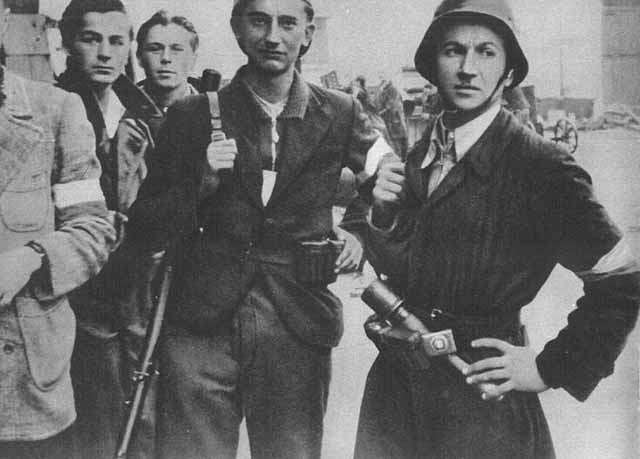
Today we rightfully hold up the heroism and indisputable righteousness of the Haitian revolution, Nat Turner’s rebellion, Native American resistance to genocide, and the Warsaw Ghetto Uprising. No person committed to human freedom and justice looks back on any of these movements and celebrates the excesses and atrocities committed by them. Nor should we today. With hindsight and a moral compass, however, we are capable of locating their root cause and assigning ultimate responsibility to the slavers, the colonizers, and the fascists. The violence of the oppressed in such historical situations must be understood as a byproduct of the much greater and crueler violence of the oppressors.
Decolonization and socialism from below
In their eagerness to condemn the non-condemners, La Botz and Shalom casually throw out another dangerous accusation:
The tendency to overlook, excuse, or apologize for Hamas is not only a mistake in itself, but it tends toward the campist politics that support uncritically so-called anti-imperialist nations such as China, Russia, and Iran because they are opponents of the United States.
The implication is that anyone refusing to fixate on October 7 and the violence of Hamas is, at best, naïve and ignorant of the importance of principled criticism, and, at worst, a closeted Stalinist. La Botz and Shalom attempt thereby to forge a connection between their own pedantic lecturing and the liberatory tradition of socialism from below. Such slanders cannot be allowed to stand.
Revolutionary socialism from below stands for the self-activity of working and oppressed people for self-determination. That means genuine solidarity with movements from below all around the world, even against governments competing with our own government. Like capitals on the global market, these states are a band of hostile brothers competing with each other in various ways, but they are always on the same side against the working people of the world and will come to each other’s aid to maintain the stability of the capitalist market. True solidarity means building relationships with organizations and individuals in struggle in these countries.
These social movements, of course, are not monoliths. Just like social movements in the United States, they are contradictory and involve competing trends, strategies, and visions of liberation, all of which have important consequences for the outcome of social struggles. In Palestine, for example, a decentralized and sporadic youth-led movement has been brewing since 2015, culminating most prominently in the Unity Intifada of 2021 that enveloped all of historic Palestine. The cross-party, locally rooted movement has rejected the conciliationism of the Palestinian Authority and has begun to incorporate armed resistance groups in the West Bank.
From a socialist perspective, this is a far more promising basis for an egalitarian national liberation movement than Hamas alone. In many ways, the reconfiguration of Palestinian resistance represents the future of the Palestinian liberation struggle, and Western leftists should do everything we can to build relationships with these forces and provide meaningful solidarity.
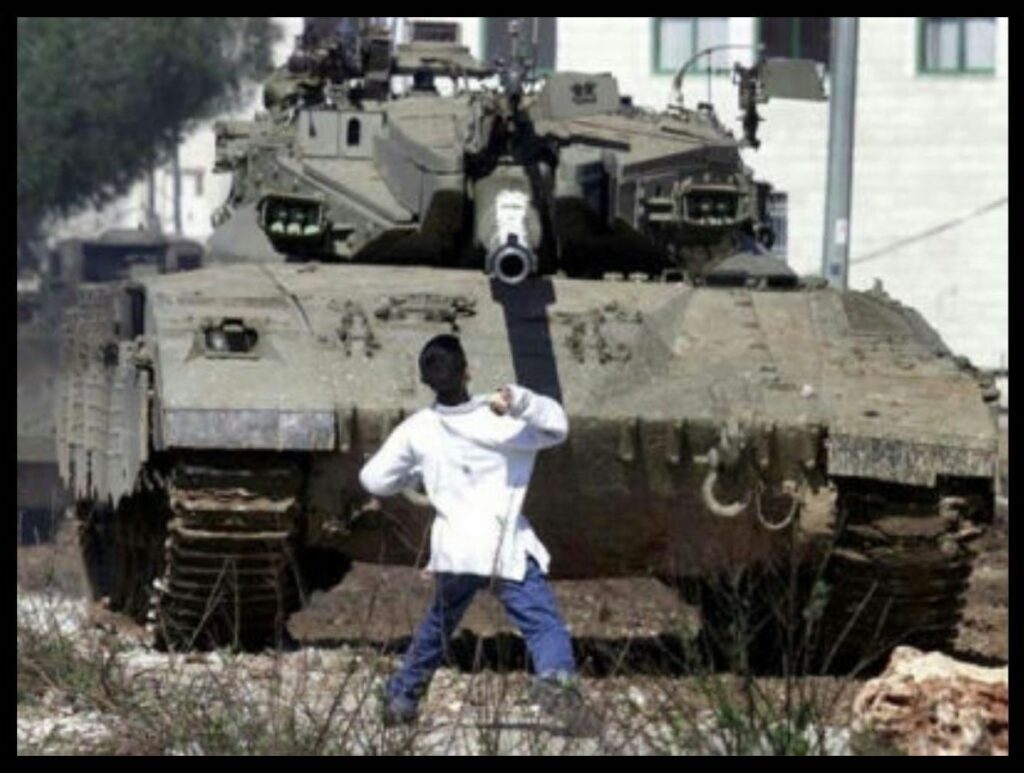
Issuing condemnations and policing the non-condemnations of others in the West during an active genocide does nothing to help these forces resisting apartheid and occupation. Furthermore, while critiques are a constant feature of evolving social movements, those critiques are only taken seriously because they come from within the resistance and liberation movement itself and share its general aims and its fate. La Botz and Shalom write from a place not of unconditional solidarity with the Palestinian liberation movement, but instead make their support for the actual resistance happening dependent on the politics of its chief drivers.
Socialism from below is an affirmation of self-activity, of liberation, and the cause of the oppressed wherever they are fighting. We may have political differences, but not conditions for our solidarity against brutal oppression.
Western attempts to dictate the proper terms of resistance to colonialism, like that of La Botz and Shalom, undermine efforts at building a genuine internationalist left from below. Their sole outcome is to show Palestinians and others living under the yoke of U.S. imperialism that they cannot trust the Left within the belly of the beast. That is precisely what has led to the results described by Steven Salaita:
Palestinians have determined to proceed without their Western custodians. Decolonization is a grueling project, generally beyond the acumen of those weaned in comfort. The professional classes are stuck in bourgeois abstractions (from which they derive so many rewards) or profess a material politics they don’t in reality support. They demand a bloodless liberation, but only without the colonizer’s blood, even as the native bleeds out in full view of the world. They demand a revolt without consequence, a caucus of pristine victims politely asking to stay alive.
This outcome is not inevitable. Other socialists in the U.S. can and do affirm the rights of colonized people to resist colonization and understand the desperate circumstances in which they find themselves. Amid the suffocating discourse condemning and dissecting every attempt at Palestinian resistance, we must remind ourselves what Palestinians are fighting for: survival, self-determination, and liberation. It is to the eternal credit of the Palestinians that they have never given up on the demand for liberation. If we give up on this demand, in the words of Andreas Malm, “There is nothing left, other than learning to die.”
A time for courage
The effect of the continual, obsessive demands to condemn Hamas is to obfuscate the genocide still being enacted now. It fabricates an ethical stance from which Israel’s industrial-scale slaughter can be considered as part of violence “on both sides.” Such condemnations are the master’s tools.
Socialists who want to contribute to real international solidarity must refuse to play the condemnation game. It does not build solidarity. It does not strengthen the cause of the globally exploited and oppressed. It does not prevent a genocide. Ultimately, the historic moment we are currently living through is not about individuals in the U.S. and their real or perceived moral integrity. As the clear-eyed New Socialist editorial put it,
It isn’t about what ‘public opinion’ thinks of anti-genocide protestors, or about forming ‘compelling narratives’, or about how we ‘feel’ as spectators. We are not the story here. Our personal brands and public images do not matter. What matters is the imminent and ongoing genocide of the Palestinian people—a collective punishment that is effectively co-signed every time we take our eyes from the horizon of liberation or the bonds of solidarity, and focus instead on our own navels.
There is no need to excuse the violence on October 7 in order to recognize it for what it is: a direct product of settler colonialism in all its brutality. The attempt to extract one moment of violence for special scrutiny out of the decades of bloody occupation, especially during an ongoing genocide of Palestinians, is an act of colonial narcissism.
The socialist movement, such as it exists, has a choice. We can attach conditions to our solidarity and lecture the courageous anticolonial movements of the world on the proper, Western-approved methods for their struggles. Or we can heed the calls of the Palestinians for full-throated condemnation of empire and its Zionist settler-colonial outpost. We can either join Michael Walzer in asking, “What are the obligations of the oppressed?” or we can join the courageous Palestinian liberation movement by doing everything we can to grind the tanks of empire to a halt from where we are.
If unconditional commitment to Palestinian liberation is too unsubtle, too vehement, too philistine, then so be it. It is not equivocation or nuance, but courage that is demanded by the scale of the crises we are facing and the intractability of the ruling classes perpetuating them. Only that courage will fuel the revolutionary movement required to bring about a lasting human liberation. That is why we must declare with the Palestinians:
Glory to the martyrs!
Long live the Intifada!

